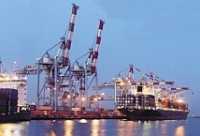Shtark also noted that the government should decide to give the green light to begin the development of the second stage of the port of Ashdod
Mrs. Iris Shtark, Ashdod port Chairperson noted at the open discussion held during the second session of the port2port 2007 conference held last week, that the Ashdod port company was under negotiation with a major international shipping company to offer direct shipping service from Ashdod port to the USA.
During the session which dealt with the issue whether Israel's ports will become regional hubs, Shtark noted that hub ports offer large growth potential to the Israeli port industry but in order to reach hub status, productivity and service quality at the port should increase.
The panel discussion in which several prominent port industry representatives participated: Professor Yehuda Hayut, Shipping and Logistics expert; Mr. Yair Hazan, Chairman, Eilat Port Company; Mr. Zvi Plada, Chairman, Sea & Air Transportation Committee, Manufacturers Association of Israel; Mr. Gideon Siterman, Director General, Ministry of Transport & Road Safety; Mr. Shaul Zemach, Deputy Director, Budget division, Ministry of Finance; Mr. Reuven Zuk, President, Israel Chamber of Shipping.
The panel discussed the question whether a third port should be built in Israel. Shtark noted that there was no reason to build a third port in Israel.
The government, according to Shtark, should decide, instead, to give the green light to begin the development of the second stage of the port of Ashdod. She also added that many shipping companies are interested to invest in modern port facility at the Eastern part of the Mediterranean and such companies could be considered as partners to large scale port investment in the existing port facilities or even in developing new port facilities.
Shtark: Port of Ashdod in negotiation to offer direct shipping service to the USA
Shtark also noted that the government should decide to give the green light to begin the development of the second stage of the port of Ashdod
19.02.07 / 00:00
•
More articles that may interest you

El Al to axe flights to Larnaca & Istanbul

Valentine's Day: Israel to export over 100 million flowers to Europe

Yehuda Rotem, former Zim Lines director general, passed away

Mr. David Bayne to give a lecture at port2port 2007

Manufacturers Association: Industrial exports up 11%; high-tech up 20%

Ashdod Port workers broke pledge and began strike which ended after 2 days
More news from Sea Transport Section
>Israel Ports Company presented $6b master plan for Israel’s ports sector/29.01.07
>Moshe Mitz was nominated new Eilat port director general/29.01.07
>Special bulk packing system exhibited at Plasto Ispak 2007 exhibition/29.01.07
>Ashdod port strike postponed by labor federation/22.01.07
>Further reduction of War Risk Surcharge for Israel/15.01.07
>Zim considers to end direct container service between Eilat and South Africa/15.01.07
>For the first time since port reform: Trade Union declared labor disputes at Ashdod port/15.01.07
>Zim's CFO awarded by the Forum of Chief Finance Officers/07.01.07
>EMTA: Suspension of Ashdod congestion surcharge/07.01.07
>Feller: northern business community request the expansion of the Haifa port/02.01.07
